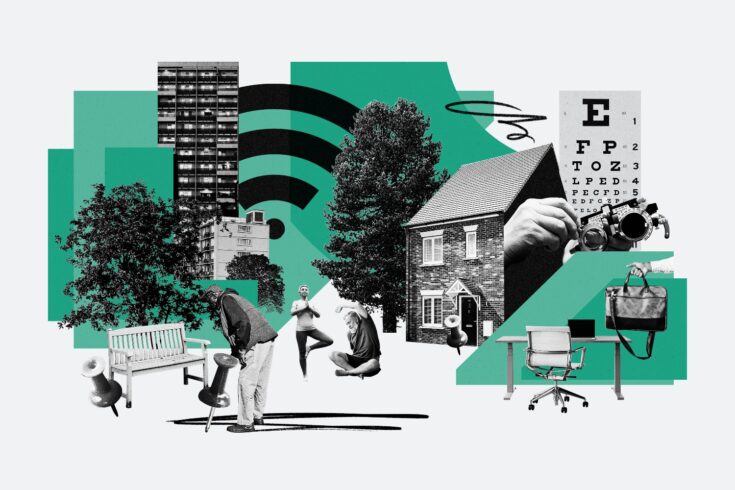An extra year of healthy life is worth more than money can buy. And yet, if we all enjoyed that extra year of healthy living it would be worth a huge £5 trillion to the UK economy, says leading economist Professor Andrew Scott, whose analysis has been published in the academic journal Nature Ageing.
That value can come through people remaining economically active as employees, volunteers and informal carers.
1 October was the UN’s International Day of Older Persons and a timely reminder that how we respond to our ageing population is both a moral imperative and an economic opportunity.
It is a big issue facing the UK, and for us at UKRI it also raises questions about what we can and should be doing better to address this and other major challenges for society.
Ageing will transform society
Population ageing is poised to transform all areas of society, including how we live, work and relate to one another.
This was at the fore of government thinking in 2017 when healthy ageing became one of four cross-government ‘grand challenges’.
Much has happened since then. Making more of our later years remains part of the levelling up agenda, but are we making the most of the opportunity? In turn, what does that say about UKRI’s ability to have an impact on the big issues facing society?
We must embrace the full range of research
Ageing is something we all experience. It touches almost every aspect of our society, including housing, communities, transport, leisure and healthcare. Most businesses have an interest in ageing through their employees and products, yet few consider it a defining characteristic of what they do. So where do you start?
Mention ageing and most people conjure up images of frailty, of hospitals and care homes. And while advances in public health and medicine have played a huge part in the success that is our longer lives, the medicalisation of ageing obscures the real opportunity.
Advances in understanding the biology of ageing may well provide the means to extend healthy life. I can see they have a place in a life sciences industrial strategy, and in the longer term should have a place in the NHS, but they are unlikely to be the answer on their own. Yet, they attract the most attention.
Our ambition should be to rise to the challenge of an ageing society and enable a population-level impact over the next 10-to-15 years, realising that ‘extra year of healthy life’ from this piece’s title. To do that we need to look more broadly and embrace the full range of our research capabilities.
Combining social purpose and economic goals
Our research and innovation ecosystem is well-honed for translating cutting edge science into solutions that provide business growth and economic benefits. But is that system fit for purpose when it comes to addressing big opportunities that combine economic benefit with social impact?
We started to explore that question with the Innovation Caucus, who looked at the potential for a strategy based around a set of places or clusters of activity to develop businesses in healthy ageing.
The study surprised us. It found that the process of innovation was different in areas that brought together social purpose and economic goals.
A stable and enduring local policy commitment and the expertise of specialist research centres were more important than the specialist knowledge, shared facilities or networking that characterise a typical innovation cluster.
Is there a better way to address ageing?
Health, ageing and wellbeing is a strategic priority for UKRI. UKRI can support a fantastic range of resources relevant to healthy ageing, much of which is focused on long-term bets in science and technology.
Can UKRI’s support be brought to bear in other ways as well to address a big issue such as ageing?
The good news is that ageing is already a feature of work right across UKRI’s research councils. There is an active cross-council ageing research forum.
Our healthy ageing challenge has commissioned research in areas as diverse as the role of noise and pollution in ageing healthily, connecting through culture as we age, supporting healthier working lives, and designing homes for healthy cognitive ageing. Already the new accessible home designs are embedded in a development in Dundee.
We have reached into the wider research community and begun opening new avenues to turn research in the arts, humanities and social sciences into business opportunities.
We found that process has enriched the way researchers from science and technology disciplines have approached their own innovations, drawing on insight from gerontology to put people, not just science, at the heart of their design work.
Targeting social and economic returns
We have also brought in investment from charities and from impact investors, who target social and environmental improvements alongside financial return. This has provided growth funding alongside the private equity investment more usually associated with early-stage innovations.
Our researchers and innovators also benefit from the expertise of around 40 UKRI-funded research centres that specialise in healthy ageing.
We can and should do more. Many of these examples are unique to the healthy ageing challenge and offer a blueprint for future UKRI operation.
UKRI can address two aspects here as a priority.
First, strengthening the ability of research in the arts, humanities and social sciences to have an impact on innovation. This means support and finance for innovators and working with institutions to ensure that the focus on ‘technology transfer’ is extended to other areas of research.
Second, embracing a mission-led collaborative approach that commissions world-class programmes that draw on the full range of areas that UKRI supports.
Top image: Credit: UKRI




